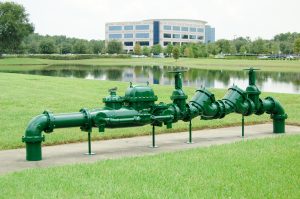 Backflow is a word that we rarely like to hear in the plumbing industry. “Backflow” is anything that has to do with contaminated water flowing backwards into the main water line or into a water supply. A problem with backflow can be anywhere from a minor inconvenience to a catastrophic contamination problem that costs a ton of money to fix. Backflow preventers and other plumbing equipment can help you ensure that you never have to deal with a backflow problem.
Backflow is a word that we rarely like to hear in the plumbing industry. “Backflow” is anything that has to do with contaminated water flowing backwards into the main water line or into a water supply. A problem with backflow can be anywhere from a minor inconvenience to a catastrophic contamination problem that costs a ton of money to fix. Backflow preventers and other plumbing equipment can help you ensure that you never have to deal with a backflow problem.
Chances are, you’ve already got a backflow preventer hooked up to your main water line that connects to the municipality’s water supply. If there’s a massive flood or some plumbing problem that immediately reduces water pressure, you’ve got to make sure that you don’t contaminate your clean water with waste-water. So, take a gander at our breakdown of a backflow preventer and make sure you ask your Ambler, PA plumber if your plumbing is ready to stop backflow.
“How Does a Backflow Preventer Work?”
It’s simple really, a backflow preventer is just a pipe that only allows water to flow through it in one direction. If water tries to flow backwards through it, it will seal off and stop the flow. Think of it like a gate that only allows water to enter and exit in one direction.
“How Does Contamination Happen Without a Backflow Preventer?”
Let’s say you’ve got a sprinkler system set up in your backyard, and heavy rainfall causes your lawn to flood, or the ground to get extremely saturated with water. This increases the pressure on your sprinkler system, to the point where water might start flowing back into your sprinklers and pipes when they aren’t on. Depending on how bad the flooding is or how powerful that pressure difference is, this contaminated groundwater could end up going all the way back to your main water line. This means that eventually, you’ll be washing your dishes with muddy water from your lawn. Yuck!
With a backflow preventer, no matter how pressurized that water is or how flooded your lawn is, you’ll never have to worry about contaminated water flowing into your main plumbing system. Backflow preventers can be placed at strategic locations throughout your home to make sure that your plumbing system is sealed tightly.
“Do I Need a Backflow Preventer?”
Most city ordinances require a home to be built with a backflow preventer when connected to the city’s main water line, so at least that’s covered. However, that doesn’t guarantee that your plumbing is safe from contamination. Having a backflow preventer installed anywhere incoming water and wastewater might be cross-connected (like your sprinkler system or toilet) could save you the trouble of dealing with backflow contamination.
Ideally, you’re going to want to run this by your plumber. There might already be a backflow preventer set up on certain water lines, but the only person who is going to give you the advice you need when it comes to plumbing equipment is a plumber with the right training and expertise.
Contact our team at Carney Plumbing Heating & Cooling. We’ll take care of any and all of your plumbing needs!

